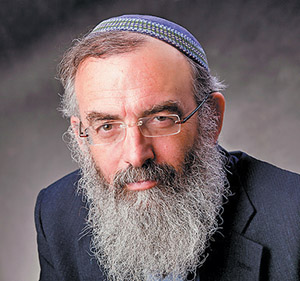
Englewood—Scholars-in-Residence are a way of life in our community, and it is not often that Rabbi David Stav, who was appointed last week as the successor to Rabbi Shlomo Riskin at Ohr Torah Stone in Efrat, comes to town.
Rabbi Shmuel Goldin, Ahavath Torah’s rabbi, told JLNJ, “On a personal and professional level I am thrilled to welcome Rabbi Stav. We have developed a relationship over the years and I have come to respect him deeply for his scholarship, sincerity, and deep commitment to the entirety of the Jewish nation.”
There is an old Chinese curse: May you live in interesting times. Rabbi Stav lives in interesting times in a very interesting place and does very interesting things. He was the first chief candidate for Chief Rabbi who served in the IDF (as a tank commander in Chevron) and someone who believes in teaching children the facts of life. He stands at the intersection of religion and politics, and is often a target for right and left. One thing everyone does agree on is that he is a brilliant iconoclast—in a first such ever event, last week Tzohar hosted a conference for 150 frum women on feminine sexuality.
Said R’ Goldin, “I am certain his continued work in Shoham, at the helm of Tzohar, and as co-chancellor of Ohr Torah Stone, Rav Stav will continue to make critical contributions to Jewish thought and practice.”
Rav Stav, who ran for Ashkenazi Chief Rabbi of Israel and is the chief rabbi of Shoham, is also the founder of Tzohar, an organization that uses halacha to promote the unity of the Jewish people. How do you use halacha to promote basic human rights? You use it to help people get married, convert, promote respect between people and work hard on “Agunah prevention” via the use of a prenuptial agreement—setting the terms of the get before the marriage.
Said R’ Goldin, “Under his leadership Tzohar has become a dominant force in Israeli society and is creating a rabbinate that is responsive and accessible.”
In a conversation with JLNJ, shortly after he got off his flight from Lod, he said, you use halacha to change the system from within and without. Rav Stam confirmed that creating a responsive and accessible rabbinate is precisely his goal. But doesn’t that also put him in the crosshairs? Don’t his actions infuriate the haredim?
“No,” he says. “Not the haredi people. They realize that what I am doing helps them also. It gives them options. The truth is that the struggle is with haredi leaders and politicians, the fellows who worry that we will affect their power to control haredi people.”
Many American Jews are torn right now because of the existential challenges facing our Israeli brothers and sisters. Many of them are ardent Zionists, many preparing to make Aliyah, and they worry about what they see as rising sexism, racism and sinat chinom. They see a diminishing of democracy in the treatment of women and refugees who are called “infiltrators.”
Rav Stav was direct, especially when he was asked about the rise in racism in general. “We have to confront a complicated challenge because we have to raise families in Israel—6-7 million Jews surrounded by Arabs who want to kill them, and you are teaching them to preserve human rights and the dignity of human beings. It is not as easy as it might sound. There is no one solution or recipe that will give a precise answer.”
Rabbi Stav said he had given a shiur to a roomful of IDF soldiers earlier in the week. “I told them, there is one challenge we should all be aware of. We have to evaluate our own values and know which is worth more than the other and when to put one over the other…and that there is a price we pay when we do that. These choices affect our morality and our souls, and despite that we have to makes those [existential] choices and pay those prices. The educational challenge is to get people to recognize that so that they make the right decisions.”
One of the decisions he strongly believes people have to make is to sign those prenups. He really wants them mainstreamed. “Usually I belong to the national way of thinking that strives to bring solutions. The big changes will start from outside but will be accepted within the system from outside the system.”
When asked about the establishment of an independent beit din, like the International Beit Din in Riverdale, Rav Stav said, “There is no way to establish a private court in Israel, there is no way to deal with batei din when the government will not allow that to happen. But using a prenup in Israel forces the rabbanut to deal with the civil courts there, because the civil courts reinforce the strength of the rabbanut when they place sanctions on such husbands. At one point he said, “And you will help me with that!” meaning JLNJ should encourage their use.
The problem in America, Rav Stav says, “is that there are two systems, so Israel is easier because the rabbanut using the right tools that the government gave them should have solved the problem. But the judges in the courts are appointed by the politicians, and that is where their loyalty lies, so it makes it a challenge.”
And he says of his visit to Englewood, “This Shabbos we will stay away from the corruption and be inspired instead.”
Said Rabbi Goldin, “We are looking forward to an inspirational Shabbat as we learn from and share with Rabbi Stav.”
The speaking schedule is Friday night: Topic: Who says you are Jewish? At the home of Judy and Martin Braun, 218 Sunset at 8:30 p.m.; Shabbos morning in the Straus main sanctuary: Religious Establishment Without Corruption. Is it Possible?; Seudat Shlisheet in the Eckstein Social Hall: The Tzohar Revolution—Heart and Soul.
By Jeanette Friedman










